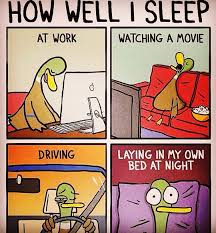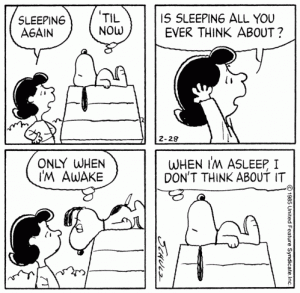 Today’s Guest Blog: Sleeping Well, Remembering Dreams is written by Christian Gerike M.A, who teaches The Psychology of Dreams at Sonoma State University, Rohnert Park, California.
Today’s Guest Blog: Sleeping Well, Remembering Dreams is written by Christian Gerike M.A, who teaches The Psychology of Dreams at Sonoma State University, Rohnert Park, California.
It is Part I of a two Part series about Sleeping and Dreaming; you can read Part II: Remembering Dreams here.
Sleeping Well, Remembering Dreams
Plenty of good sleep makes it easier to remember one’s dreams. Our sleep and dream cycle is about 90 minutes long, with the dream periods increasing in length as the night progresses. The first dream might be 10 minutes, but at around 8 hours of sleep, dreams can be 45 minutes long. So, with 8 hours of sleep, you’ll have had that much more opportunity to have dreamt. The more dreams one has and the longer they are the better the chances that some dreaming will be remembered. There are many approaches to sleeping better and longer; presented below are just a few of the ways.

Sleep Cycle
In sleeping we cycle through several stages of light sleeping to deeper sleeping and then up again to REM (rapid-eye movement sleep). As one goes through these stages, the REM portion of the cycle increases in time, with as much as 45 minutes of REM sleep prior to waking up for the day. While dreaming can occur throughout the night, it is in REM sleep that our most vivid dreaming occurs and it is the last REM sleep in which our longest dreaming occurs. It is often from this last cycle of REM that we remember many of our dreams.

Our memory of a dream memory generally occurs at the point we wake up; one may notice that any time one wakes up that there is some memory of dreaming, Dreams can be fragmented and brief; hence the longer our dreams, the easier it is to remember at least a portion of them. Thus the longer we sleep, the better the chances that we will enter the longer dream stages, increasing the possibility of remembering our dreams.
Improving Sleep in Six Easy Ways:
There are various ways to induce better and longer sleep
We all differ in what we can or cannot do, and how interested we may be in doing any of this. Take this to whatever levelyou feel comfortable with.
#1: Try to go to sleep on a regular schedule, same time every night; get at least 6 hours of sleep at a minimum; seven to eight is preferable, though we all vary.
#2: High protein diets result in high energy and reduce calm, so avoid before sleeping. Avoid fatty and spicy foods which can elevate body temperature. Avoid

alcohol and drugs (except prescriptions as necessary). Avoid large meals within two to four hours of sleeping. Avoid caffeinated drinks, though the effects can vary for people. At one time I couldn’t even have coffee early afternoon without affecting my sleep.
#3: Get plenty of exercise; spend a part of your day outdoors for both fresh air and exercise, and the aesthetic calmness that nature can provide.

#4: The temperature of the bedroom is important to facilitate sleeping. One wants to be neither too hot nor too cold. One’s body, however, needs a bit of a drop in temperature in order to fall asleep. A cool well-ventilated room, between 65-75 degrees Fahrenheit, is preferable, particularly the lower end of this scale. Generally heat can make it difficult to fall asleep and can fragment your sleep. Everyone, however, has their own best temperature setting for sleeping. Try and find your temperature and adjust accordingly (heater, windows, blankets)

#5: Jot down notes about what you need “to do” the next day, transfer the worry you may have about that into your notes, let them carry that load.

#6: Avoid electronics and bright lights prior to going to sleep. The two to four-hour avoid rule is not a bad one here also. But, in our high-tech constant communication world, this is highly unlikely, but do try to turn everything off at least ½ hour before going to sleep.
There are several benefits to avoiding bright and electronic lights prior to sleeping. The oscillating light from a computer screen or a TV, for example, is excitatory and keeps one stimulated and awake. Also, light interferes with the production of melatonin, a hormone necessary for sleep. An atmosphere of low lighting for a while before going to sleep facilitates melatonin production. One wants melatonin produced prior to sleeping, not while tossing and turning trying to sleep.
Another advantage of lowering the light prior to sleeping is that it can be a ritual informing your body that it is time to go to sleep.
(In the next Mindfunda blog, we will look at Part II: Remembering Dreams.)
MINDFUNDA FREEBIE:
If you want to sleep well and remember more dreams, here is a FREE eBook
for you with ten easy tips to quickly increase your dream memory.


